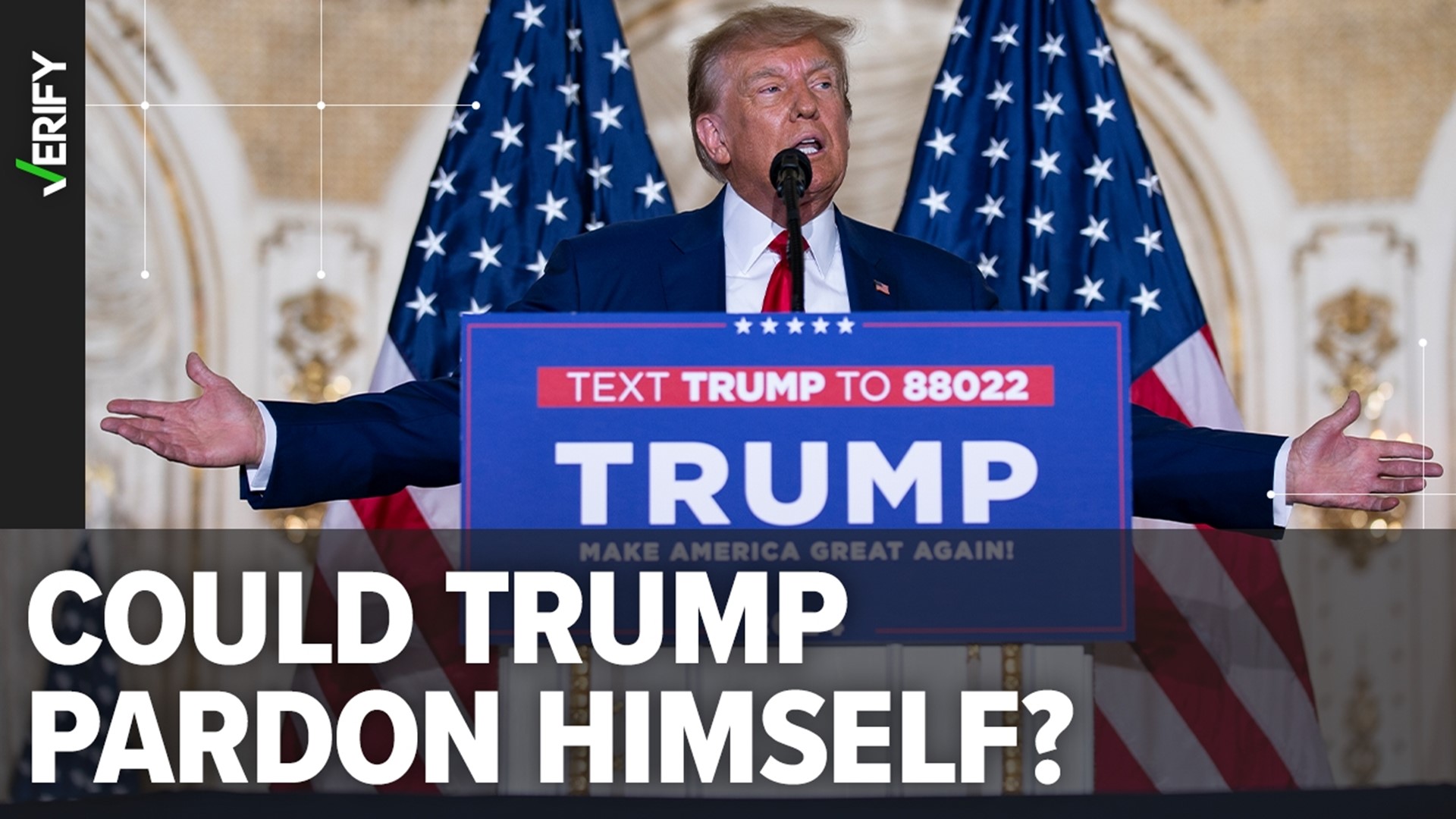Many VERIFY readers have sent us questions about what comes next for former President Donald Trump as he faces four criminal indictments.
After Trump’s most recent federal indictment, one of the top questions we received was whether the former president could be pardoned if he is convicted, either by himself or someone else. A pardon can reduce or eliminate the punishment for certain crimes.
VERIFY is breaking down the possible pardon scenarios following Trump’s fourth indictment – two of which are federal and two that have been brought by states.
THE SOURCES
- U.S. Constitution, Article II Section 2
- 1974 Department of Justice memo
- New York state Constitution
- New York state government
- Georgia State Board of Pardons and Paroles
- Georgia state Constitution
- Doron Kalir, clinical professor of law at Cleveland-Marshall College of Law
- Norman Eisen, senior fellow in governance studies at the Brookings Institution
WHAT WE FOUND
Two of Trump’s indictments are federal. In the most recent federal indictment, Trump was charged with four federal counts related to his efforts to overturn the 2020 election results. He is also facing 40 federal felony charges related to the mishandling of classified documents at his Mar-a-Lago estate in Florida.
The states of Georgia and New York have also brought cases against Trump.
In Georgia, Trump is facing 13 charges, including racketeering, soliciting a public officer to violate their oath, conspiracy to commit forgery and filing false documents. In the New York case, Trump is charged with 34 state felony counts of falsifying business records in the first degree.
Here is a breakdown of the potential pardon scenarios for Trump’s federal and state cases if he is convicted.
Federal cases
The U.S. Constitution gives the president broad power to issue pardons for federal convictions.
The only explicit restriction outlined in the Constitution is that a president cannot pardon someone in cases of impeachment.
“You can’t be impeached and then be pardoned for that because that would subvert the whole purpose,” Doron Kalir, clinical professor of law at Cleveland-Marshall College of Law, said.
If Trump is convicted while President Joe Biden is still in office, Biden could grant him a pardon in the federal cases.
But Biden said during his presidential campaign in 2020 that he would not use his power to pardon the former president or stop any investigations of Trump.
Could Trump pardon himself in the federal cases if he is re-elected in 2024?
Trump claimed in 2018 that he has the “absolute right” to pardon himself if he is convicted of crimes while in office. But legal experts cannot say with any certainty whether a president’s pardon power extends to their ability to grant a self-pardon.
The Constitution does not specifically address whether the president can pardon themselves, nor has the Supreme Court ruled on the issue.
Shortly before former President Richard Nixon resigned in 1974, the Department of Justice asserted in a memo that a self-pardon would conflict with a longstanding legal principle that “no person may be a judge in his or her own case.”
Norman Eisen, senior fellow in governance at the Brookings Institution, said in 2018 that the reasoning behind the DOJ opinion is “compelling,” but the opinion “is not binding.” The opinion was also never tested in court because Nixon did not try to pardon himself.
This means the president’s ability to pardon themselves is an untested legal gray area.
Georgia state case
The U.S. Constitution makes it clear that the president cannot pardon themselves or others in state cases, Kalir told VERIFY.
Depending on the state, that power typically rests with the governor, a state board or a combination of the two.
In Georgia, the governor cannot unilaterally issue pardons. Instead, the pardon process is left up to the State Board of Pardons and Paroles.
The agency was born out of questions in the 1940s about how some Georgia governors had handled pardons.
In February 1943, Georgia’s General Assembly signed a law that created the State Board of Pardons and Paroles as an independent agency, according to the board’s website. Georgia voters later ratified an amendment to the State Constitution that established the board’s authority.
The State Constitution says the board has the “power of executive clemency,” including the abilities to grant pardons and paroles, as well as commuting and remitting sentences for people convicted of a crime.
It also outlines how the board is selected. Georgia’s governor appoints five board members to seven-year terms, subject to state Senate confirmation, according to the State Constitution.
“Once confirmed, members would be insulated from political pressures by the fact that no one official could remove them from office until they completed their terms,” the board says on its website.
A pardon in Georgia is “an order of official forgiveness” granted to people “who have maintained a good reputation in the community” after completing their sentences. Pardons are not available to people who are currently incarcerated.
The pardon does not remove the crime from a person’s record, though it may help them “advance in employment or education” opportunities, the state board says.
Georgia has the following rules about who qualifies for a pardon:
You must have completed all sentence(s) at least five years prior to applying.
You must have lived a law-abiding life during the five years prior to applying.
You cannot have any pending charges.
All fines must be paid in full.
New York state case
In New York, the State Constitution gives the governor power to grant clemency to people who have been convicted of crimes in the state.
Clemency in New York commonly takes the form of a commutation or a pardon, the state government says. A commutation is generally a reduction in the length of a person’s sentence, while a pardon reduces or eliminates the consequences of a criminal conviction.
According to the state government, anyone who has been convicted of a crime in New York can apply for a pardon. A pardon in New York is typically only considered for people who have “completed all court-imposed requirements connected to their conviction and sentence, including community supervision, probation, and/or payment of fines and other costs,” the state says.
But Kalir said a pardon in Trump’s New York case is unlikely if he is convicted in the state.
“At the end of the day, it might be the New York case…that would prove to be the hardest to overcome because the governor of New York is currently a Democrat, and I don’t think it’s likely to change any time soon,” he said.












